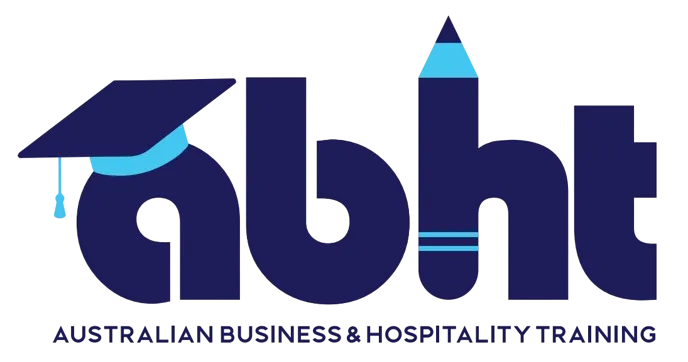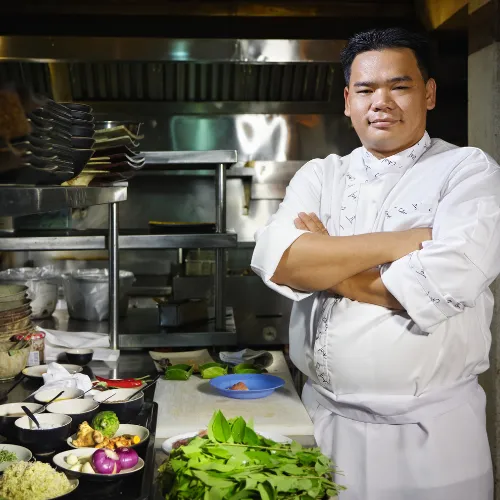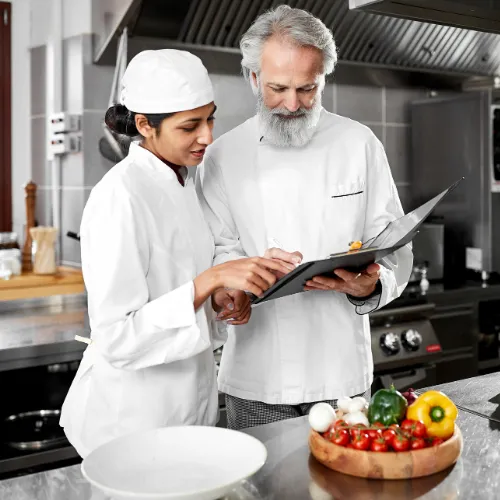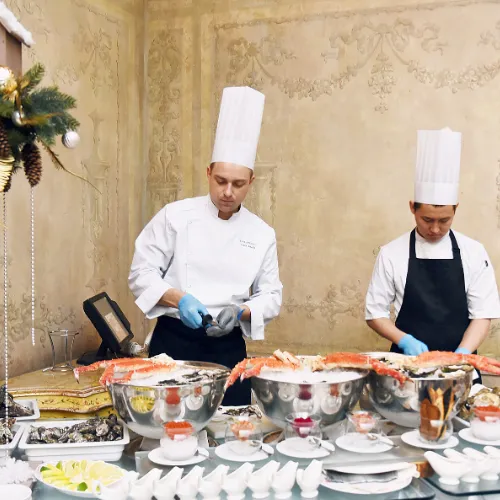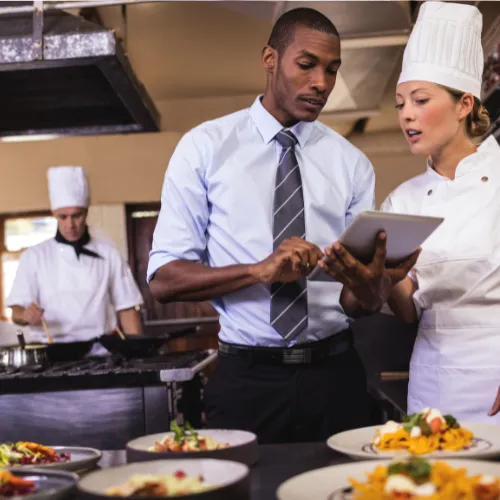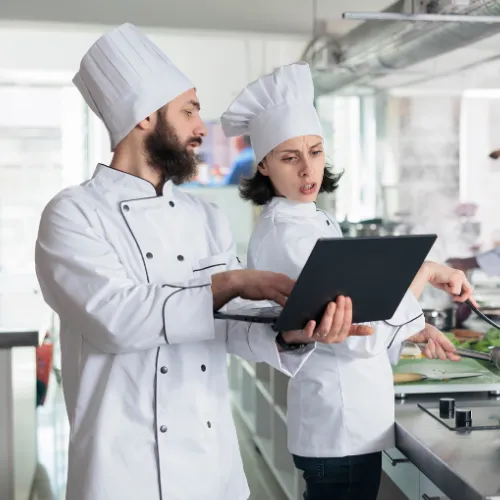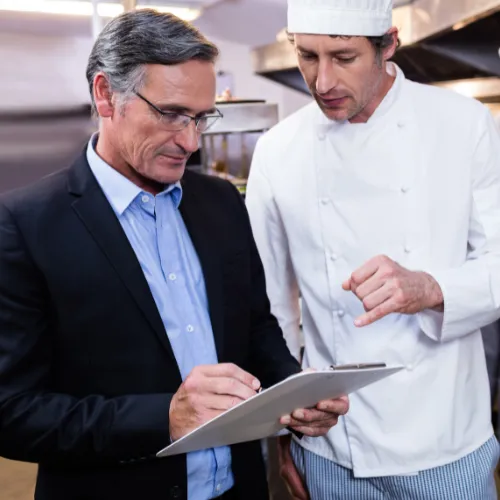SIT40521 - Certificate IV Kitchen Management (Restaurant)
Course Description
Ready to take charge of the kitchen like a culinary boss? Our Certificate IV in Kitchen Management is the ultimate recipe for turning your passion for food into leadership skills. You’ll go from prepping ingredients to running the whole show—ordering supplies, managing a team, and making sure every dish that leaves the kitchen is as flawless as your knife skills.
This course is perfect for aspiring head chefs, kitchen managers, or anyone who dreams of being the calm amidst the chaos of a busy restaurant. You'll learn how to handle everything from budgeting (yes, numbers matter!) to keeping your kitchen running like a well-oiled machine. Whether you're whipping up a five-star menu or juggling the daily madness of a commercial kitchen, we’ll get you ready to do it with a smile.
What will you study?
In a Certificate IV in Kitchen Management (Restaurant Specialisation), you'll complete 33 units covering advanced culinary techniques, kitchen leadership, menu planning, and operational management tailored for restaurant environments.

Course Enrolment:
Anytime

Entry Requirements:
Nil

Course Duration:
Up to 3 years

Location:
ABHT are approved to deliver this course nationally via our online platform and can deliver this training face to face in the workplace throughout Metro & SE QLD.

Study Options:
Training can be delivered face to face in the workplace or in a traditional classroom environment. Students can also study within their own schedule using our online platform or combination of face-to-face and online training.

Study Pathways:
Diploma of Hospitality Management
Certificate IV in Kitchen Management Training Plan
SITHCCC023* Use food preparation equipment
This unit describes the performance outcomes, skills and knowledge required to safely use commercial kitchen equipment to prepare a range of different food types.The unit applies to operational personnel responsible for general food preparation tasks in hospitality and catering organisations. It applies to individuals who work with very little independence and under close supervision. They follow predefined organisational procedures and report any discrepancies to a higher-level staff member for action.
SITHCCC027* Prepare dishes using basic methods of cookery
This unit describes the performance outcomes, skills and knowledge required to use a range of basic cookery methods to prepare dishes. The unit applies to cooks working in hospitality and catering organisations. This could include restaurants, educational institutions, health establishments, defence forces, cafeterias, kiosks, cafes, residential caterers, in-flight and other transport caterers, and event and function caterers. It applies to individuals who work with very little independence and under close supervision and guidance of more senior chefs. They follow predefined organisational procedures and report any discrepancies to a higher-level staff member for action.
SITHCCC028* Prepare appetisers and salads
This unit describes the performance outcomes, skills and knowledge required to prepare appetisers and salads following standard recipes. It requires the ability to select and prepare ingredients, and to use relevant equipment and cookery and food storage methods. The unit applies to cooks working in hospitality and catering organisations. This could include restaurants, educational institutions, health establishments, defence forces, cafeterias, kiosks, cafes, residential caterers, in flight and other transport caterers, and event and function caterers. It applies to individuals who work with very little independence and under close supervision and guidance of more senior chefs. They follow predefined organisational procedures and report discrepancies to a higher-level staff member for action.
SITHCCC029* Prepare stocks, sauces and soups
This unit describes the performance outcomes, skills and knowledge required to prepare various stocks, sauces and soups following standard recipes. It requires the ability to select and prepare ingredients, and to use relevant equipment and cookery and food storage methods. The unit applies to cooks working in hospitality and catering organisations. This could include restaurants, educational institutions, health establishments, defence forces, cafeterias, kiosks, cafes, residential caterers, in flight and other transport caterers, and event and function caterers. It applies to individuals who work with very little independence and under close supervision and guidance of more senior chefs. They follow predefined organisational procedures and report any discrepancies to a higher level staff member for action.
SITHCCC030* Prepare vegetable, fruit, eggs and farinaceous dishes
This unit describes the performance outcomes, skills and knowledge required to prepare and cook various vegetable, fruit, egg and farinaceous dishes following standard recipes. It requires the ability to select and prepare ingredients, and to use relevant equipment, cookery and food storage methods. The unit applies to cooks working in hospitality and catering organisations. This could include restaurants, educational institutions, health establishments, defence forces, cafeterias, kiosks, cafes, residential caterers, in flight and other transport caterers, and event and function caterers. It applies to individuals who work with very little independence and under close supervision and guidance of more senior chefs. They follow predefined organisational procedures and report any discrepancies to a higher level staff member for action.
SITHCCC031* Prepare vegetarian and vegan dishes
This unit describes the performance outcomes, skills and knowledge required to prepare and cook various vegetarian and vegan dishes following standard recipes. It requires the ability to select and prepare ingredients, and to use relevant equipment, cookery and food storage methods. The unit applies to cooks working in hospitality and catering organisations. This could include restaurants, educational institutions, health establishments, defence forces, cafeterias, kiosks, cafes, residential caterers, in flight and other transport caterers, and event and function caterers. It applies to individuals who work under the guidance of more senior chefs. They demonstrate autonomy and judgement to complete routine activities and take limited responsibility in known and stable contexts within established parameters.
SITHCCC035* Prepare poultry dishes
This unit describes the performance outcomes, skills and knowledge required to prepare and cook a range of poultry dishes following standard recipes. It requires the ability to select, prepare and portion poultry, and to use relevant equipment, cookery and food storage methods. The unit applies to cooks working in hospitality and catering organisations. This could include restaurants, educational institutions, health establishments, defence forces, cafeterias, kiosks, cafes, residential caterers, in flight and other transport caterers, and event and function caterers. It applies to individuals who work under the guidance of more senior chefs. They demonstrate autonomy and judgement to complete routine activities and take limited responsibility in known and stable contexts within established parameters.
SITHCCC036* Prepare meat dishes
This unit describes the performance outcomes, skills and knowledge required to prepare and cook a range of meat dishes following standard recipes. It requires the ability to select, prepare and portion meat, and to use relevant equipment, and cookery and food storage methods. The unit applies to cooks working in hospitality and catering organisations. This could include restaurants, educational institutions, health establishments, defence forces, cafeterias, kiosks, cafes, residential caterers, in flight and other transport caterers, and event and function caterers. It applies to individuals who work under the guidance of more senior chefs. They demonstrate autonomy and judgement to complete routine activities and take limited responsibility in known and stable contexts within established parameters.
SITHCCC037* Prepare seafood dishes
This unit describes the performance outcomes, skills and knowledge required to prepare and cook a range of fish and shellfish dishes following standard recipes. It requires the ability to select, prepare and portion seafood, and to use relevant equipment, and cookery and food storage methods. The unit applies to cooks working in hospitality and catering organisations. This could include restaurants, educational institutions, health establishments, defence forces, cafeterias, kiosks, cafes, residential caterers, in flight and other transport caterers, and event and function caterers. It applies to individuals who work under the guidance of more senior chefs. They demonstrate autonomy and judgement to complete routine activities and take limited responsibility in known and stable contexts within established parameters.
SITHCCC041* Produce cakes, pastries and breads
This unit describes the performance outcomes, skills and knowledge required to produce cakes, pastries and breads in a commercial kitchen following standard recipes. It requires the ability to select, prepare and portion ingredients; and to use relevant equipment a range of cookery methods to make and decorate cakes, pastries and breads, and food storage methods. It does not cover the specialist skills used by patissiers to produce specialist patisserie products. These are covered in the range of patisserie units coded ‘PAT’. The unit applies to hospitality and catering organisations that produce and serve cakes, pastries and breads, including hotels, restaurants and patisseries. It applies to individuals who work under the guidance of more senior chefs. They demonstrate autonomy and judgement to complete routine activities and take limited responsibility in known and stable contexts within established parameters.
SITHCCC042* Prepare food to meet special dietary requirements
This unit describes the performance outcomes, skills and knowledge required to prepare dishes for people who have special dietary needs for lifestyle, medical or religious reasons. It requires the ability to confirm the dietary requirements of customers, use special recipes, select special ingredients and produce food to satisfy special requirements. This unit does not include recipe planning for special diets which is covered in the unit SITHKOP012 Develop recipes for special dietary requirements. The unit applies to cooks and patissiers working in hospitality and catering organisations. This could include restaurants, educational institutions, health establishments, defence forces, cafeterias, kiosks, cafes, residential caterers, in flight and other transport caterers, and event and function caterers. It applies to individuals who work under the guidance of more senior chefs. They demonstrate autonomy and judgement to complete routine activities and take limited responsibility in known and stable contexts within established parameters.
SITHCCC043* Work effectively as a cook
This unit describes the performance outcomes, skills and knowledge required to work as a cook. It incorporates all aspects of organising, preparing and cooking a variety of food items across different service periods and menu types; using a range of cooking methods and team coordination skills. The unit integrates key technical and organisational skills required by a qualified commercial cook. It brings together the skills and knowledge covered in individual units and focuses on the way they must be applied in a commercial kitchen.The unit applies to cooks working in hospitality and catering organisations. This could include restaurants, educational institutions, health establishments, defence forces, cafeterias, kiosks, cafes, residential caterers, in flight and other transport caterers, and event and function caterers. Menu types may be classical, contemporary or ethnic and service may be formal or informal. It applies to individuals who work under the guidance of more senior chefs. They demonstrate autonomy and judgement to complete routine activities and take limited responsibility in known and stable contexts within established parameters.
SITHKOP010 Plan and cost recipes
This unit describes the performance outcomes, skills and knowledge required to plan and cost recipes for dishes or food product ranges for any type of cuisine or food service style. It requires the ability to identify customer preferences, select recipes to meet customer and business needs, cost recipes and evaluate their success. It does not cover the specialist skills used by senior catering managers and chefs to design and cost complex menus after researching market preferences and trends. Those skills are covered in SITHKOP015 Design and cost menus. The unit applies to hospitality and catering organisations. Recipes can be for ongoing food service, for an event or function, or for a food product range such as patisserie products. It applies to cooks, patissiers and catering personnel who usually work under the guidance of more senior chefs.
SITHKOP012* Develop recipes for special dietary requirements
This unit describes the performance outcomes, skills and knowledge required to develop recipes for people who have special dietary needs for lifestyle, medical or religious reasons. It requires the ability to identify the dietary requirements of customers, develop recipes to meet those requirements, cost recipes and to monitor and evaluate the success of recipe performance. The unit applies to all hospitality and catering organisations that prepare and serve food. This includes hotels, clubs, restaurants, educational institutions, health establishments, defence forces, cafeterias, kiosks, cafes, residential caterers, in flight and other transport caterers, event and function caterers. It applies to those people who operate independently or with limited guidance from others such as senior cooks, chefs, catering supervisors and managers.
SITHKOP013* Plan cooking operations
This unit describes the performance outcomes, skills and knowledge required to plan the production of food in commercial kitchens. It requires the ability to organise required food supplies for food production and supervise food production processes. Food production can be for any type of cuisine and food service style. It may include Asian cookery, patisserie products and bulk-cooked foods. The unit applies to hospitality and catering organisations, including hotels, restaurants, clubs, educational institutions, health establishments, defence forces, cafeterias, residential caterers, in flight and other transport caterers, event and function caterers. It applies to those people who operate independently or with limited guidance from others including senior chefs and catering managers.
SITHKOP015* Design and cost menus
This unit describes the performance outcomes, skills and knowledge required to design profitable menus for all types of cuisines and food service styles. It requires the ability to identify target markets for the organisation, design menus to meet market preferences, price menu items and to monitor and evaluate the success of menu performance. The unit applies to hospitality and catering organisations and to those people who operate independently and are responsible for making a range of operational and strategic decisions. This includes senior catering managers, and sous, head and executive chefs.
SITHPAT016* Produce desserts
This unit describes the performance outcomes, skills and knowledge required to produce hot, cold and frozen desserts following standard and special dietary recipes. It requires the ability to select, prepare and portion ingredients and to use equipment and a range of cookery methods to make and present desserts. The unit applies to hospitality and catering organisations that produce and serve desserts, including hotels, restaurants, clubs and patisseries. It applies to patissiers who usually work under the guidance of more senior pastry chefs.
SITHCCC044 Prepare specialised food items
This unit describes the performance outcomes, skills and knowledge required to prepare and cook food items that are more unusual in nature than those in standard recipes. It requires the ability to select and prepare ingredients, use relevant equipment, specialised cookery and food storage methods.
The unit applies to cooks working in hospitality and catering organisations. This could include restaurants, educational institutions, health establishments, defence forces, cafeterias, kiosks, cafes, residential caterers, in flight and other transport caterers, and event and function caterers.
Because the nature of food items prepared is specialised, it may apply to chefs and cooks with advanced skills or with skills in very particular styles of cooking.
SITHCCC026* Package prepared foodstuffs
This unit describes the performance outcomes, skills and knowledge required to package and label prepared foodstuffs for storage and transportation. It requires the ability to check the quality of food and select correct packaging materials. The unit applies to operational personnel in hospitality and catering organisations that prepare, package and label food. This could include restaurants, educational institutions, health establishments, defence forces, cafeterias, kiosks, cafes, residential caterers, in-flight and other transport caterers, and event and function caterers. It applies to individuals who work with very little independence and under close supervision. They follow predefined organisational procedures and report any discrepancies to a higher-level staff member for action.
SITHCCC040 Prepare and serve cheese
This unit describes the performance outcomes, skills and knowledge required to prepare and serve cheese and cheese dishes. This requires a comprehensive knowledge of cheese varieties.
The unit applies to hospitality and catering organisations where cheese is served as a menu course. Responsibility for cheese may rest with a range of individuals depending on the organisation. It may include cooks or senior food and beverage attendants.
Cheeses may include milk-based products from cows, sheep, goats or buffalo, or alternatives such as soy. They may be traditional, contemporary or specialist and may be locally produced or imported.
Food Safety Supervisor
SITXFSA005 Use hygienic practices for food safety
This unit describes the performance outcomes, skills and knowledge required to use personal hygiene practices to prevent contamination of food that might cause food-borne illnesses. It requires the ability to follow predetermined organisational procedures and to identify and control food hazards. The unit applies to all organisations with permanent or temporary kitchen premises or smaller food preparation or bar areas. This includes restaurants, cafes, clubs, hotels, and bars; tour operators; attractions; function, event, exhibition and conference catering; educational institutions; aged care facilities; correctional centres; hospitals; defence forces; cafeterias, kiosks, canteens and fast food outlets; residential catering; in-flight and other transport catering. It applies to food handlers who directly handle food or food contact surfaces such as cutlery, plates and bowls during the course of their daily work activities. This includes cooks, chefs, caterers, kitchen stewards, kitchen hands, bar, and food and beverage attendants, and sometimes room attendants and front office staff. Food handlers must comply with the requirements contained within the Australia New Zealand Food Standards Code. In some States and Territories businesses are required to designate a food safety supervisor who is required to be certified as competent in this unit through a registered training organisation.
SITXFSA006 Participate in safe food handling practices
This unit describes the performance outcomes, skills and knowledge required to handle food safely during the storage, preparation, display, service and disposal of food. It requires the ability to follow predetermined procedures as outlined in a food safety program. The unit applies to all organisations with permanent or temporary kitchen premises or smaller food preparation areas. This includes restaurants, cafes, clubs, and hotels; tour operators; attractions; function, event, exhibition and conference catering; educational institutions; aged care facilities; correctional centres; hospitals; defence forces; cafeterias, kiosks, canteens and fast food outlets; residential catering; in-flight and other transport catering. Safe food handling practices are based on an organisation’s individual food safety program. The program would normally be based on the hazard analysis and critical control points (HACCP) method, but this unit can apply to other food safety systems. It applies to food handlers who directly handle food during the course of their daily work activities. This includes cooks, chefs, caterers, kitchen hands and food and beverage attendants. Food handlers must comply with the requirements contained within the Australia New Zealand Food Standards Code. In some States and Territories businesses are required to designate a food safety supervisor who is required to be certified as competent in this unit through a registered training organisation.
SITXFSA008* Develop and implement a food safety program
This unit describes the performance outcomes, skills and knowledge required to develop, implement and evaluate a food safety program for all stages in the food production process, including receipt, storage, preparation, service and disposal of food. It requires the ability to determine program requirements and prepare policies and procedures for other personnel to follow. The unit applies to all organisations with permanent or temporary kitchen premises or smaller food preparation areas. This includes restaurants, cafes, clubs, and hotels; tour operators; attractions; function, event, exhibition and conference catering; educational institutions; aged care facilities; correctional centres; hospitals; defence forces; cafeterias, kiosks, canteens, and fast food outlets; residential catering; in-flight and other transport catering. A food safety program would most commonly be based on the hazard analysis and critical control points (HACCP) method, but this unit can apply to other food safety systems. It applies to senior personnel who work independently and who are responsible for making strategic decisions on establishing and monitoring risk control systems for food related hazards. This could include chefs, kitchen managers, catering managers, fast food store managers and owner-operators of small business catering operations or retail food outlets.
Management and Operations
SITXCOM010 Manage conflict
This unit describes the performance outcomes, skills and knowledge required to resolve complex or escalated complaints and disputes with internal and external customers and colleagues. It requires the ability to use effective conflict resolution techniques and communication skills to manage conflict and develop solutions. It does not cover formal negotiation, counselling or mediation. The unit applies to all tourism, travel, hospitality and event sectors. The unit applies mainly to senior operational personnel, supervisors and managers who operate with some level of independence and use discretion and judgement to resolve conflicts.
SITXFIN009 Manage finances within a budget
This unit describes the performance outcomes, skills and knowledge required to take responsibility for budget management where others may have developed the budget. It requires the ability to interpret budgetary requirements, allocate resources, monitor actual income and expenditure, and report on budgetary deviations. The skills and knowledge for budget development are covered in SITXFIN010 Prepare and monitor budgets. This unit applies to all tourism, travel, hospitality and event sectors. The budget may be for an entire organisation, for a department or for a particular project or activity. It applies to those people who operate independently or with limited guidance from others. This includes supervisors and departmental managers.
SITXINV006* Receive, store and maintain stock
This unit describes the performance outcomes, skills and knowledge required to check and take delivery of stock and appropriately store, rotate and maintain the quality of stock items. It requires the ability to store perishable supplies in optimum conditions to minimise wastage and avoid food contamination. The unit is particularly important within a food safety regime and applies to hospitality and catering organisations, including hotels, restaurants, clubs, educational institutions, health establishments, defence forces, cafeterias, residential caterers, in flight and other transport caterers, event and function caterers. Personnel at many levels use this skill in the workplace during the course of their daily activities, including cooks, chefs, caterers, and kitchen attendants.
SITXINV007 Purchase Goods
This unit describes the performance outcomes, skills and knowledge required to determine the purchasing requirements for goods, source suppliers, discuss requirements, and assess the quality of goods before purchase.
It does not cover the specialist skills to systematically purchase and control the overall supply of goods for an organisation.
The unit applies to all tourism, travel, hospitality and event industry sectors where the purchase of any type of good takes place, including food and beverage supplies. Purchasing goods may involve placing an order for future delivery or purchasing goods face-to-face and taking immediate delivery.
The unit applies to operational personnel who operate with some level of independence and under limited supervision.
SITXMGT004 Monitor work operations
This unit describes the performance outcomes, skills and knowledge required to oversee and monitor the quality of day-to-day work. It requires the ability to communicate effectively with team members, plan and organise operational functions, and solve problems. The unit applies to all industry sectors, and to individuals operating at a team leading, supervisory or frontline management level.
Work Health and Safety
SITXWHS007 Implement and monitor work health and safety practices
This unit describes the performance outcomes, skills and knowledge required to implement predetermined work health, safety and security practices designed, at management level, to ensure a safe workplace. It requires the ability to monitor safe work practices and coordinate consultative arrangements, risk assessments, work health and safety training, and the maintenance of records. The unit applies to all tourism, travel, hospitality and event sectors and to any small, medium or large organisation. It applies to those people who operate independently or with limited guidance from others. This includes supervisors and departmental managers. This unit incorporates the requirement, under state and territory work health and safety (WHS) legislation, for businesses to take a systematic approach to managing the safety of their workers and anyone else in the workplace.
People and Culture
SITXHRM009 Lead and manage people
This unit describes the performance outcomes, skills and knowledge required to lead and manage people individually and in teams, and support and encourage their commitment to the organisation. It requires the ability to lead by example and manage performance through effective leadership. The unit applies to individuals who operate independently and are responsible for leading and motivating people and teams. This includes supervisors, and operational and senior managers. The unit applies to all tourism, travel, hospitality and event sectors.
SITXHRM008 Roster staff
This unit describes the performance outcomes, skills and knowledge required to develop, administer and communicate staff rosters. It requires the ability to plan rosters according to industrial provisions, operational efficiency requirements, and within wage budgets. This unit applies to individuals responsible for developing staff rosters for situations involving potentially large numbers of staff working across a range of different service periods or shifts. It does not apply to small office environments. It applies to senior personnel who operate independently or with limited guidance from others, including dedicated specialist staff or operational supervisors and managers. The unit applies to all tourism, travel, hospitality and event sectors.
SITXCOM007 Show social and cultural sensitivity
This unit describes the performance outcomes, skills and knowledge required to be socially aware when serving customers and working with colleagues. It requires the ability to communicate with people from a range of social and cultural groups with respect and sensitivity, and to address cross-cultural misunderstandings should they arise.
The unit applies to all tourism, travel, hospitality and event sectors. All personnel at all levels use this skill in the workplace during the course of their daily activities.
SIRXOSM002 Maintain ethical and professional standards when usining social media and online platforms
This unit describes the performance outcomes, skills and knowledge required to source information on, and work according to, a range of ethical and professional standards when using social media and online platforms for business purposes.
This key skill underpins effective performance when utilising social media and online platforms for diverse purposes. It applies to individuals working at all levels from operational personnel through to managers.
This unit applies to self-employed individuals, and owners and employees of any type of micro, small, medium or large organisation that utilises social media and online tools for customer engagement including commercial, not-for-profit and government organisations.
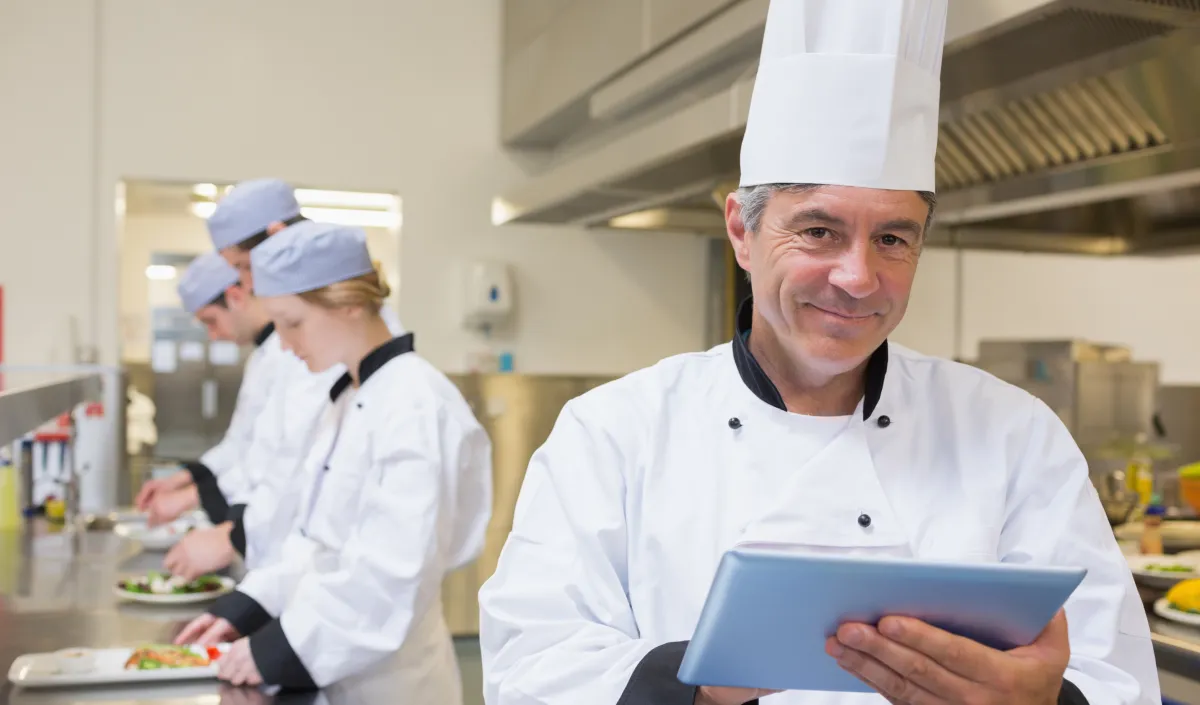
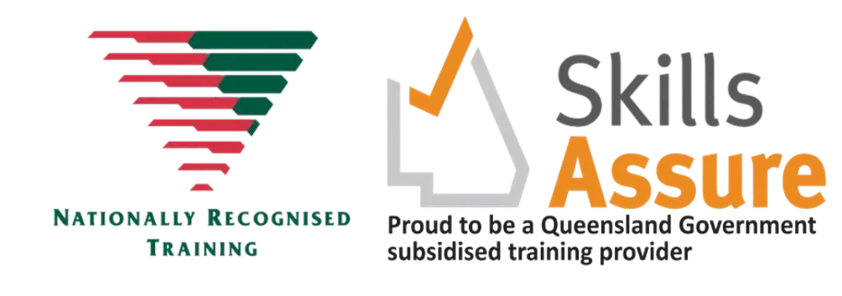
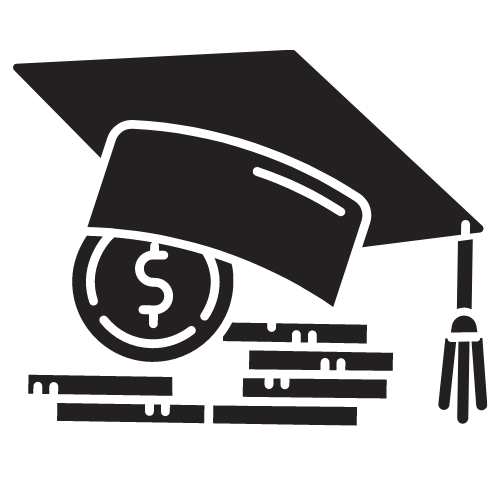
Course Fees:
There are five available enrolment options to choose from for this course:

Course Fees:
There are five available enrolment options to choose from for this course:
Career Start:
Career Start provides individuals with the skills and support to start their career. The program provides training to help
individuals find a job and supports those already employed to move into more skilled roles or full-time employment, including after completing an apprenticeship or traineeship.
Career Start offers either a general training pathway or employment-based apprenticeship or traineeship pathway
Career Start - Apprenticeship/Traineeship:
For apprenticeships and traineeships, an individual must be employed as an apprentice or trainee. This pathway is part of the Australian Apprenticeships system and requires all parties to sign an Apprenticeship and Traineeship Training Contract (the Contract) as defined by the Further Education and Training Act 2014 (the Act).
Please Note: The funding provided by Queensland Government doesn't cover the full cost of training.
ABHT is required to levy a Student Contribution Fee:
Non-concessional $1.60 per nominal hour
Concessional $1.12 per nominal hour
The total student contribution fees for the Certificate IV in Kitchen Management:
Non-Concessional: $2,176.00
Concessional: $1523.20
Career Boost - General Training
Career Boost aims to take a person’s career to the next level, enabling them to grow and apply their skills to existing or new job roles and to support productivity growth and
workplace innovation. The program delivers training to help
individuals develop the higher-level skills needed to secure employment, advance their careers, or progress to further
education and training to undertake.
Please Note: The funding provided by Queensland Government doesn't cover the full cost of training.
We are required to charge co-contribution fees for this course Fees are charged and collected at the Unit of Competency rate.
• Non-Concessional Fees: $1 per unit
• Concessional Fees: $0.70 per unit
The total co-contribution fees for the Certificate IV in Kitchen Management
Non-Concessional: $33.00
Concessional: $23.10
Free Apprenticeships for Under 25:
Students aged under 25 are fee free
School-Based Traineeship:
School-Based Traineeships are fee free
Fee for Service:
Certificate IV in Kitchen Management - $13,200.00
Payment Structure for Courses over $1500.00
We make paying for your course simple and manageable.
Courses under $1,500: Pay upfront and in full at enrolment.
Courses over $1,500 A simple payment plan can arranged which will include a $1500 deposit on enrolment.
We also offer payment plans via Ezidebit direct debit, making it even easier to spread the cost of your course.
📌 Ezidebit terms, conditions, and fees apply. Full details will be provided during the enrolment process.
SIT40521 - Certificate IV Kitchen Management
Course Description
Ready to take charge of the kitchen like a culinary boss? Our Certificate IV in Kitchen Management is the ultimate recipe for turning your passion for food into leadership skills. You’ll go from prepping ingredients to running the whole show—ordering supplies, managing a team, and making sure every dish that leaves the kitchen is as flawless as your knife skills.
This course is perfect for aspiring head chefs, kitchen managers, or anyone who dreams of being the calm amidst the chaos of a busy restaurant. You'll learn how to handle everything from budgeting (yes, numbers matter!) to keeping your kitchen running like a well-oiled machine. Whether you're whipping up a five-star menu or juggling the daily madness of a commercial kitchen, we’ll get you ready to do it with a smile.
What will you study?
In a Certificate IV in Kitchen Management (Restaurant Specialisation), you'll complete 33 units covering advanced culinary techniques, kitchen leadership, menu planning, and operational management tailored for restaurant environments.

Course Enrolment:
Anytime

Entry Requirements:
Nil

Course Duration:
12mths

Location:
ABHT are approved to deliver this course nationally via our online platform and can deliver this training face to face in the workplace throughout Metro & SE QLD.

Study Options:
Training can be delivered face to face in the workplace or in a traditional classroom environment. Students can also study within their own schedule using our online platform or combination of face-to-face and online training.

Study Pathways:
Diploma of Hospitality Management
Certificate IV in Kitchen Management Training Plan
Commercial Cookery
SITHCCC023* Use food preparation equipment
This unit describes the performance outcomes, skills and knowledge required to safely use commercial kitchen equipment to prepare a range of different food types.The unit applies to operational personnel responsible for general food preparation tasks in hospitality and catering organisations. It applies to individuals who work with very little independence and under close supervision. They follow predefined organisational procedures and report any discrepancies to a higher-level staff member for action.
SITHCCC027* Prepare dishes using basic methods of cookery
This unit describes the performance outcomes, skills and knowledge required to use a range of basic cookery methods to prepare dishes. The unit applies to cooks working in hospitality and catering organisations. This could include restaurants, educational institutions, health establishments, defence forces, cafeterias, kiosks, cafes, residential caterers, in-flight and other transport caterers, and event and function caterers. It applies to individuals who work with very little independence and under close supervision and guidance of more senior chefs. They follow predefined organisational procedures and report any discrepancies to a higher-level staff member for action.
SITHCCC028* Prepare appetisers and salads
This unit describes the performance outcomes, skills and knowledge required to prepare appetisers and salads following standard recipes. It requires the ability to select and prepare ingredients, and to use relevant equipment and cookery and food storage methods. The unit applies to cooks working in hospitality and catering organisations. This could include restaurants, educational institutions, health establishments, defence forces, cafeterias, kiosks, cafes, residential caterers, in flight and other transport caterers, and event and function caterers. It applies to individuals who work with very little independence and under close supervision and guidance of more senior chefs. They follow predefined organisational procedures and report discrepancies to a higher-level staff member for action.
SITHCCC029* Prepare stocks, sauces and soups
This unit describes the performance outcomes, skills and knowledge required to prepare various stocks, sauces and soups following standard recipes. It requires the ability to select and prepare ingredients, and to use relevant equipment and cookery and food storage methods. The unit applies to cooks working in hospitality and catering organisations. This could include restaurants, educational institutions, health establishments, defence forces, cafeterias, kiosks, cafes, residential caterers, in flight and other transport caterers, and event and function caterers. It applies to individuals who work with very little independence and under close supervision and guidance of more senior chefs. They follow predefined organisational procedures and report any discrepancies to a higher level staff member for action.
SITHCCC030* Prepare vegetable, fruit, eggs and farinaceous dishes
This unit describes the performance outcomes, skills and knowledge required to prepare and cook various vegetable, fruit, egg and farinaceous dishes following standard recipes. It requires the ability to select and prepare ingredients, and to use relevant equipment, cookery and food storage methods. The unit applies to cooks working in hospitality and catering organisations. This could include restaurants, educational institutions, health establishments, defence forces, cafeterias, kiosks, cafes, residential caterers, in flight and other transport caterers, and event and function caterers. It applies to individuals who work with very little independence and under close supervision and guidance of more senior chefs. They follow predefined organisational procedures and report any discrepancies to a higher level staff member for action.
SITHCCC031* Prepare vegetarian and vegan dishes
This unit describes the performance outcomes, skills and knowledge required to prepare and cook various vegetarian and vegan dishes following standard recipes. It requires the ability to select and prepare ingredients, and to use relevant equipment, cookery and food storage methods. The unit applies to cooks working in hospitality and catering organisations. This could include restaurants, educational institutions, health establishments, defence forces, cafeterias, kiosks, cafes, residential caterers, in flight and other transport caterers, and event and function caterers. It applies to individuals who work under the guidance of more senior chefs. They demonstrate autonomy and judgement to complete routine activities and take limited responsibility in known and stable contexts within established parameters.
SITHCCC035* Prepare poultry dishes
This unit describes the performance outcomes, skills and knowledge required to prepare and cook a range of poultry dishes following standard recipes. It requires the ability to select, prepare and portion poultry, and to use relevant equipment, cookery and food storage methods. The unit applies to cooks working in hospitality and catering organisations. This could include restaurants, educational institutions, health establishments, defence forces, cafeterias, kiosks, cafes, residential caterers, in flight and other transport caterers, and event and function caterers. It applies to individuals who work under the guidance of more senior chefs. They demonstrate autonomy and judgement to complete routine activities and take limited responsibility in known and stable contexts within established parameters.
SITHCCC036* Prepare meat dishes
This unit describes the performance outcomes, skills and knowledge required to prepare and cook a range of meat dishes following standard recipes. It requires the ability to select, prepare and portion meat, and to use relevant equipment, and cookery and food storage methods. The unit applies to cooks working in hospitality and catering organisations. This could include restaurants, educational institutions, health establishments, defence forces, cafeterias, kiosks, cafes, residential caterers, in flight and other transport caterers, and event and function caterers. It applies to individuals who work under the guidance of more senior chefs. They demonstrate autonomy and judgement to complete routine activities and take limited responsibility in known and stable contexts within established parameters.
SITHCCC037* Prepare seafood dishes
This unit describes the performance outcomes, skills and knowledge required to prepare and cook a range of fish and shellfish dishes following standard recipes. It requires the ability to select, prepare and portion seafood, and to use relevant equipment, and cookery and food storage methods. The unit applies to cooks working in hospitality and catering organisations. This could include restaurants, educational institutions, health establishments, defence forces, cafeterias, kiosks, cafes, residential caterers, in flight and other transport caterers, and event and function caterers. It applies to individuals who work under the guidance of more senior chefs. They demonstrate autonomy and judgement to complete routine activities and take limited responsibility in known and stable contexts within established parameters.
SITHCCC041* Produce cakes, pastries and breads
This unit describes the performance outcomes, skills and knowledge required to produce cakes, pastries and breads in a commercial kitchen following standard recipes. It requires the ability to select, prepare and portion ingredients; and to use relevant equipment a range of cookery methods to make and decorate cakes, pastries and breads, and food storage methods. It does not cover the specialist skills used by patissiers to produce specialist patisserie products. These are covered in the range of patisserie units coded ‘PAT’. The unit applies to hospitality and catering organisations that produce and serve cakes, pastries and breads, including hotels, restaurants and patisseries. It applies to individuals who work under the guidance of more senior chefs. They demonstrate autonomy and judgement to complete routine activities and take limited responsibility in known and stable contexts within established parameters.
SITHCCC042* Prepare food to meet special dietary requirements
This unit describes the performance outcomes, skills and knowledge required to prepare dishes for people who have special dietary needs for lifestyle, medical or religious reasons. It requires the ability to confirm the dietary requirements of customers, use special recipes, select special ingredients and produce food to satisfy special requirements. This unit does not include recipe planning for special diets which is covered in the unit SITHKOP012 Develop recipes for special dietary requirements. The unit applies to cooks and patissiers working in hospitality and catering organisations. This could include restaurants, educational institutions, health establishments, defence forces, cafeterias, kiosks, cafes, residential caterers, in flight and other transport caterers, and event and function caterers. It applies to individuals who work under the guidance of more senior chefs. They demonstrate autonomy and judgement to complete routine activities and take limited responsibility in known and stable contexts within established parameters.
SITHCCC043* Work effectively as a cook
This unit describes the performance outcomes, skills and knowledge required to work as a cook. It incorporates all aspects of organising, preparing and cooking a variety of food items across different service periods and menu types; using a range of cooking methods and team coordination skills. The unit integrates key technical and organisational skills required by a qualified commercial cook. It brings together the skills and knowledge covered in individual units and focuses on the way they must be applied in a commercial kitchen.The unit applies to cooks working in hospitality and catering organisations. This could include restaurants, educational institutions, health establishments, defence forces, cafeterias, kiosks, cafes, residential caterers, in flight and other transport caterers, and event and function caterers. Menu types may be classical, contemporary or ethnic and service may be formal or informal. It applies to individuals who work under the guidance of more senior chefs. They demonstrate autonomy and judgement to complete routine activities and take limited responsibility in known and stable contexts within established parameters.
SITHKOP010 Plan and cost recipes
This unit describes the performance outcomes, skills and knowledge required to plan and cost recipes for dishes or food product ranges for any type of cuisine or food service style. It requires the ability to identify customer preferences, select recipes to meet customer and business needs, cost recipes and evaluate their success. It does not cover the specialist skills used by senior catering managers and chefs to design and cost complex menus after researching market preferences and trends. Those skills are covered in SITHKOP015 Design and cost menus. The unit applies to hospitality and catering organisations. Recipes can be for ongoing food service, for an event or function, or for a food product range such as patisserie products. It applies to cooks, patissiers and catering personnel who usually work under the guidance of more senior chefs.
SITHKOP012* Develop recipes for special dietary requirements
This unit describes the performance outcomes, skills and knowledge required to develop recipes for people who have special dietary needs for lifestyle, medical or religious reasons. It requires the ability to identify the dietary requirements of customers, develop recipes to meet those requirements, cost recipes and to monitor and evaluate the success of recipe performance. The unit applies to all hospitality and catering organisations that prepare and serve food. This includes hotels, clubs, restaurants, educational institutions, health establishments, defence forces, cafeterias, kiosks, cafes, residential caterers, in flight and other transport caterers, event and function caterers. It applies to those people who operate independently or with limited guidance from others such as senior cooks, chefs, catering supervisors and managers.
SITHKOP013* Plan cooking operations
This unit describes the performance outcomes, skills and knowledge required to plan the production of food in commercial kitchens. It requires the ability to organise required food supplies for food production and supervise food production processes. Food production can be for any type of cuisine and food service style. It may include Asian cookery, patisserie products and bulk-cooked foods. The unit applies to hospitality and catering organisations, including hotels, restaurants, clubs, educational institutions, health establishments, defence forces, cafeterias, residential caterers, in flight and other transport caterers, event and function caterers. It applies to those people who operate independently or with limited guidance from others including senior chefs and catering managers.
SITHKOP015* Design and cost menus
This unit describes the performance outcomes, skills and knowledge required to design profitable menus for all types of cuisines and food service styles. It requires the ability to identify target markets for the organisation, design menus to meet market preferences, price menu items and to monitor and evaluate the success of menu performance. The unit applies to hospitality and catering organisations and to those people who operate independently and are responsible for making a range of operational and strategic decisions. This includes senior catering managers, and sous, head and executive chefs.
SITHPAT016* Produce desserts
This unit describes the performance outcomes, skills and knowledge required to produce hot, cold and frozen desserts following standard and special dietary recipes. It requires the ability to select, prepare and portion ingredients and to use equipment and a range of cookery methods to make and present desserts. The unit applies to hospitality and catering organisations that produce and serve desserts, including hotels, restaurants, clubs and patisseries. It applies to patissiers who usually work under the guidance of more senior pastry chefs.
SITHCCC044 Prepare specialised food items
This unit describes the performance outcomes, skills and knowledge required to prepare and cook food items that are more unusual in nature than those in standard recipes. It requires the ability to select and prepare ingredients, use relevant equipment, specialised cookery and food storage methods.
The unit applies to cooks working in hospitality and catering organisations. This could include restaurants, educational institutions, health establishments, defence forces, cafeterias, kiosks, cafes, residential caterers, in flight and other transport caterers, and event and function caterers.
Because the nature of food items prepared is specialised, it may apply to chefs and cooks with advanced skills or with skills in very particular styles of cooking.
SITHCCC026* Package prepared foodstuffs
This unit describes the performance outcomes, skills and knowledge required to package and label prepared foodstuffs for storage and transportation. It requires the ability to check the quality of food and select correct packaging materials. The unit applies to operational personnel in hospitality and catering organisations that prepare, package and label food. This could include restaurants, educational institutions, health establishments, defence forces, cafeterias, kiosks, cafes, residential caterers, in-flight and other transport caterers, and event and function caterers. It applies to individuals who work with very little independence and under close supervision. They follow predefined organisational procedures and report any discrepancies to a higher-level staff member for action.
SITHCCC040 Prepare and serve cheese
This unit describes the performance outcomes, skills and knowledge required to prepare and serve cheese and cheese dishes. This requires a comprehensive knowledge of cheese varieties.
The unit applies to hospitality and catering organisations where cheese is served as a menu course. Responsibility for cheese may rest with a range of individuals depending on the organisation. It may include cooks or senior food and beverage attendants.
Cheeses may include milk-based products from cows, sheep, goats or buffalo, or alternatives such as soy. They may be traditional, contemporary or specialist and may be locally produced or imported.
Food Safety Supervisor
SITXFSA005 Use hygienic practices for food safety
This unit describes the performance outcomes, skills and knowledge required to use personal hygiene practices to prevent contamination of food that might cause food-borne illnesses. It requires the ability to follow predetermined organisational procedures and to identify and control food hazards. The unit applies to all organisations with permanent or temporary kitchen premises or smaller food preparation or bar areas. This includes restaurants, cafes, clubs, hotels, and bars; tour operators; attractions; function, event, exhibition and conference catering; educational institutions; aged care facilities; correctional centres; hospitals; defence forces; cafeterias, kiosks, canteens and fast food outlets; residential catering; in-flight and other transport catering. It applies to food handlers who directly handle food or food contact surfaces such as cutlery, plates and bowls during the course of their daily work activities. This includes cooks, chefs, caterers, kitchen stewards, kitchen hands, bar, and food and beverage attendants, and sometimes room attendants and front office staff. Food handlers must comply with the requirements contained within the Australia New Zealand Food Standards Code. In some States and Territories businesses are required to designate a food safety supervisor who is required to be certified as competent in this unit through a registered training organisation.
SITXFSA006 Participate in safe food handling practices
This unit describes the performance outcomes, skills and knowledge required to handle food safely during the storage, preparation, display, service and disposal of food. It requires the ability to follow predetermined procedures as outlined in a food safety program. The unit applies to all organisations with permanent or temporary kitchen premises or smaller food preparation areas. This includes restaurants, cafes, clubs, and hotels; tour operators; attractions; function, event, exhibition and conference catering; educational institutions; aged care facilities; correctional centres; hospitals; defence forces; cafeterias, kiosks, canteens and fast food outlets; residential catering; in-flight and other transport catering. Safe food handling practices are based on an organisation’s individual food safety program. The program would normally be based on the hazard analysis and critical control points (HACCP) method, but this unit can apply to other food safety systems. It applies to food handlers who directly handle food during the course of their daily work activities. This includes cooks, chefs, caterers, kitchen hands and food and beverage attendants. Food handlers must comply with the requirements contained within the Australia New Zealand Food Standards Code. In some States and Territories businesses are required to designate a food safety supervisor who is required to be certified as competent in this unit through a registered training organisation.
SITXFSA008* Develop and implement a food safety program
This unit describes the performance outcomes, skills and knowledge required to develop, implement and evaluate a food safety program for all stages in the food production process, including receipt, storage, preparation, service and disposal of food. It requires the ability to determine program requirements and prepare policies and procedures for other personnel to follow. The unit applies to all organisations with permanent or temporary kitchen premises or smaller food preparation areas. This includes restaurants, cafes, clubs, and hotels; tour operators; attractions; function, event, exhibition and conference catering; educational institutions; aged care facilities; correctional centres; hospitals; defence forces; cafeterias, kiosks, canteens, and fast food outlets; residential catering; in-flight and other transport catering. A food safety program would most commonly be based on the hazard analysis and critical control points (HACCP) method, but this unit can apply to other food safety systems. It applies to senior personnel who work independently and who are responsible for making strategic decisions on establishing and monitoring risk control systems for food related hazards. This could include chefs, kitchen managers, catering managers, fast food store managers and owner-operators of small business catering operations or retail food outlets.
Management and Operations
SITXCOM010 Manage conflict
This unit describes the performance outcomes, skills and knowledge required to resolve complex or escalated complaints and disputes with internal and external customers and colleagues. It requires the ability to use effective conflict resolution techniques and communication skills to manage conflict and develop solutions. It does not cover formal negotiation, counselling or mediation. The unit applies to all tourism, travel, hospitality and event sectors. The unit applies mainly to senior operational personnel, supervisors and managers who operate with some level of independence and use discretion and judgement to resolve conflicts.
SITXFIN009 Manage finances within a budget
This unit describes the performance outcomes, skills and knowledge required to take responsibility for budget management where others may have developed the budget. It requires the ability to interpret budgetary requirements, allocate resources, monitor actual income and expenditure, and report on budgetary deviations. The skills and knowledge for budget development are covered in SITXFIN010 Prepare and monitor budgets. This unit applies to all tourism, travel, hospitality and event sectors. The budget may be for an entire organisation, for a department or for a particular project or activity. It applies to those people who operate independently or with limited guidance from others. This includes supervisors and departmental managers.
SITXINV006* Receive, store and maintain stock
This unit describes the performance outcomes, skills and knowledge required to check and take delivery of stock and appropriately store, rotate and maintain the quality of stock items. It requires the ability to store perishable supplies in optimum conditions to minimise wastage and avoid food contamination. The unit is particularly important within a food safety regime and applies to hospitality and catering organisations, including hotels, restaurants, clubs, educational institutions, health establishments, defence forces, cafeterias, residential caterers, in flight and other transport caterers, event and function caterers. Personnel at many levels use this skill in the workplace during the course of their daily activities, including cooks, chefs, caterers, and kitchen attendants.
SITXINV007 Purchase Goods
This unit describes the performance outcomes, skills and knowledge required to determine the purchasing requirements for goods, source suppliers, discuss requirements, and assess the quality of goods before purchase.
It does not cover the specialist skills to systematically purchase and control the overall supply of goods for an organisation.
The unit applies to all tourism, travel, hospitality and event industry sectors where the purchase of any type of good takes place, including food and beverage supplies. Purchasing goods may involve placing an order for future delivery or purchasing goods face-to-face and taking immediate delivery.
The unit applies to operational personnel who operate with some level of independence and under limited supervision.
SITXMGT004 Monitor work operations
This unit describes the performance outcomes, skills and knowledge required to oversee and monitor the quality of day-to-day work. It requires the ability to communicate effectively with team members, plan and organise operational functions, and solve problems. The unit applies to all industry sectors, and to individuals operating at a team leading, supervisory or frontline management level.
Work Health and Safety
SITXWHS007 Implement and monitor work health and safety practices
This unit describes the performance outcomes, skills and knowledge required to implement predetermined work health, safety and security practices designed, at management level, to ensure a safe workplace. It requires the ability to monitor safe work practices and coordinate consultative arrangements, risk assessments, work health and safety training, and the maintenance of records. The unit applies to all tourism, travel, hospitality and event sectors and to any small, medium or large organisation. It applies to those people who operate independently or with limited guidance from others. This includes supervisors and departmental managers. This unit incorporates the requirement, under state and territory work health and safety (WHS) legislation, for businesses to take a systematic approach to managing the safety of their workers and anyone else in the workplace.
People and Culture
SITXHRM009 Lead and manage people
This unit describes the performance outcomes, skills and knowledge required to lead and manage people individually and in teams, and support and encourage their commitment to the organisation. It requires the ability to lead by example and manage performance through effective leadership. The unit applies to individuals who operate independently and are responsible for leading and motivating people and teams. This includes supervisors, and operational and senior managers. The unit applies to all tourism, travel, hospitality and event sectors.
SITXHRM008 Roster staff
This unit describes the performance outcomes, skills and knowledge required to develop, administer and communicate staff rosters. It requires the ability to plan rosters according to industrial provisions, operational efficiency requirements, and within wage budgets. This unit applies to individuals responsible for developing staff rosters for situations involving potentially large numbers of staff working across a range of different service periods or shifts. It does not apply to small office environments. It applies to senior personnel who operate independently or with limited guidance from others, including dedicated specialist staff or operational supervisors and managers. The unit applies to all tourism, travel, hospitality and event sectors.
SITXCOM007 Show social and cultural sensitivity
This unit describes the performance outcomes, skills and knowledge required to be socially aware when serving customers and working with colleagues. It requires the ability to communicate with people from a range of social and cultural groups with respect and sensitivity, and to address cross-cultural misunderstandings should they arise.
The unit applies to all tourism, travel, hospitality and event sectors. All personnel at all levels use this skill in the workplace during the course of their daily activities.
SIRXOSM002 Maintain ethical and professional standards when usining social media and online platforms
This unit describes the performance outcomes, skills and knowledge required to source information on, and work according to, a range of ethical and professional standards when using social media and online platforms for business purposes.
This key skill underpins effective performance when utilising social media and online platforms for diverse purposes. It applies to individuals working at all levels from operational personnel through to managers.
This unit applies to self-employed individuals, and owners and employees of any type of micro, small, medium or large organisation that utilises social media and online tools for customer engagement including commercial, not-for-profit and government organisations.


Course Fees:
There are five available enrolment options to choose from for this course:
Career Start:
Career Start provides individuals with the skills and support to start their career. The program provides training to help
individuals find a job and supports those already employed to move into more skilled roles or full-time employment, including after completing an apprenticeship or traineeship.
Career Start offers either a general training pathway or employment-based apprenticeship or traineeship pathway
Career Start - Apprenticeship/Traineeship:
For apprenticeships and traineeships, an individual must be employed as an apprentice or trainee. This pathway is part of the Australian Apprenticeships system and requires all parties to sign an Apprenticeship and Traineeship Training Contract (the Contract) as defined by the Further Education and Training Act 2014 (the Act).
Please Note: The funding provided by Queensland Government doesn't cover the full cost of training.
ABHT is required to levy a Student Contribution Fee:
Non-concessional $1.60 per nominal hour
Concessional $1.12 per nominal hour
The total student contribution fees for the Certificate IV in Kitchen Management:
Non-Concessional: $2,176.00
Concessional: $1523.20
Career Boost - General Training
Career Boost aims to take a person’s career to the next level, enabling them to grow and apply their skills to existing or new job roles and to support productivity growth and
workplace innovation. The program delivers training to help
individuals develop the higher-level skills needed to secure employment, advance their careers, or progress to further
education and training to undertake.
Please Note: The funding provided by Queensland Government doesn't cover the full cost of training.
We are required to charge co-contribution fees for this course Fees are charged and collected at the Unit of Competency rate.
• Non-Concessional Fees: $1 per unit
• Concessional Fees: $0.70 per unit
The total co-contribution fees for the Certificate IV in Kitchen Management
Non-Concessional: $33.00
Concessional: $23.10
Free Apprenticeships for Under 25:
Students aged under 25 are fee free
School-Based Traineeship:
School-Based Traineeships are fee free
Fee for Service:
Certificate IV in Kitchen Management - $13,200.00
Payment Structure for Courses over $1500.00
We make paying for your course simple and manageable.
Courses under $1,500: Pay upfront and in full at enrolment.
Courses over $1,500 A simple payment plan can arranged which will include a $1500 deposit on enrolment.
We also offer payment plans via Ezidebit direct debit, making it even easier to spread the cost of your course.
📌 Ezidebit terms, conditions, and fees apply. Full details will be provided during the enrolment process.
Career Pathway
Career Pathway
Graduates of the Certificate IV in Kitchen Management gain the skills to lead kitchen operations, manage teams, and oversee food preparation in various hospitality settings. This qualification also opens doors to higher-level leadership opportunities or further study in hospitality management.
Graduates of the Certificate IV in Kitchen Management gain the skills to lead kitchen operations, manage teams, and oversee food preparation in various hospitality settings. This qualification also opens doors to higher-level leadership opportunities or further study in hospitality management.
Study Pathway
Study Pathway
Take your career to the next levels
Use your Certificate IV in Kitchen Management as a pathway to higher education — graduates are eligible to enrol in these next-level VET qualifications:
Take your career to the next levels
Use your Certificate IV Kitchen Management as a pathway to higher education — graduates are eligible to enrol in these next-level VET qualifications:
Ready to enrol?
Ready to enrol?
Register your interest
Fill in our expression of interest form here or call (07) 3117 9722
Eligibility Check
We will check your are eligible for Government funded training.
Enrolment Call
We call you to discuss your enrolment, eligibility for funding and training plan.
We will also confirm course costs and arrange payment or a payment plan
Online Enrolment Form
We will send you the link to our online enrolment, where you can upload your ID and submit all the details required.


Get in touch with us
Ready to connect with us?
We’re just a message away and can’t wait to hear from you!
Whether you have questions, need assistance, or just want to stay in touch, reach out and send us a message through our contact form, give us a call, or drop us an email. Our friendly team is here to help and make your experience awesome. So don’t be shy—let’s get the conversation started! 📞💌✨
Send us a message
More
Follow us
Contact Us
(07) 3117 9722
Level 2. 14 Smith Street
Mooloolaba QLD 4557
Monday to Friday
8.30am to 4.30pm
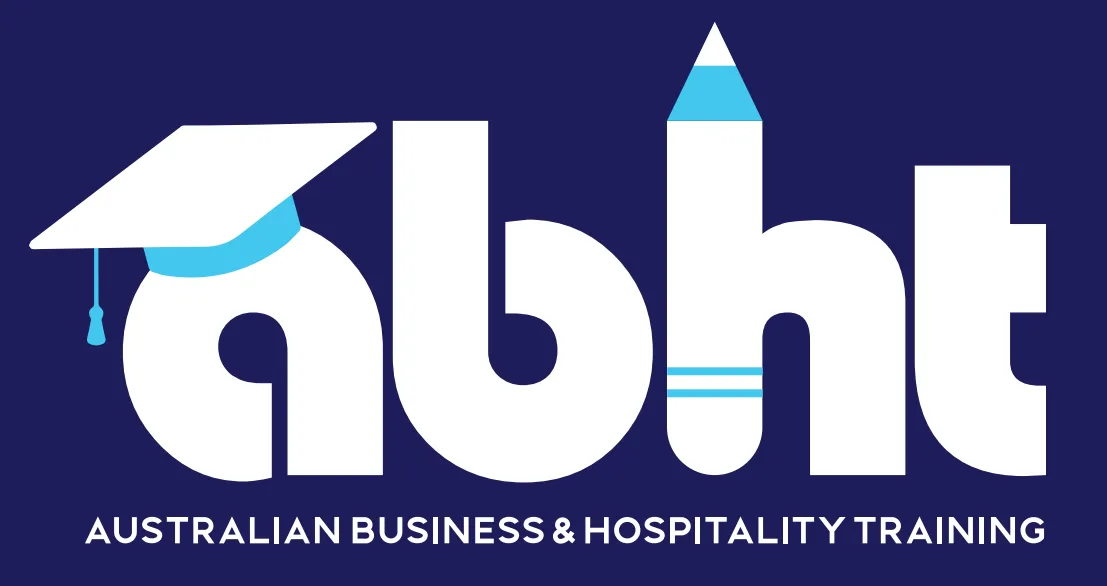
Acknowledgement of Country

In the spirit of reconciliation ABHT acknowledges the Traditional Custodians of Country throughout Australia and their connections to land, sea and community.
We pay our respect to their Elders past and present and extend that respect to all Aboriginal and Torres Strait Islander peoples today.
© Copyright 2026. Australian Business & Hospitality Training. All rights reserved. RTO#31983
